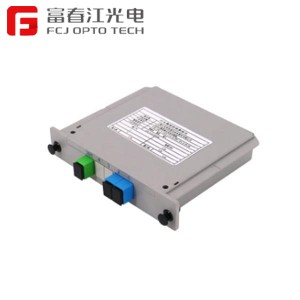FC Fiber Cable Manufacturer - Cassette Splitter Module
Product Details
| Parameter | 1x N (N≥2) |
|---|---|
| Wavelength (nm) | 1260~1650 |
| Fiber type | G657A 1 or custom-defined |
| Insertion loss (dB) | ≤3.8 |
| Return loss (dB) | ≥55 |
Common Specifications
| Specification | Details |
|---|---|
| Pigtail length (m) | 1.0(±0.1) or custom-defined |
| PDL (dB) max | ≤0.2 |
Product Manufacturing Process
The manufacturing process of FC Fiber Cable involves meticulous fabrication of optical waveguides using silica technology. This ensures precise optical signal distribution necessary for high-quality telecommunications.
Product Application Scenarios
FC Fiber Cable is ideal for use in telecommunications, FTTH, CATV networks, and other applications where stable and reliable optical connections are crucial.
Product After-Sales Service
Our comprehensive after-sales service includes technical support, warranty claims handling, and troubleshooting assistance to ensure the continued performance of your FC Fiber Cable systems.
Product Transportation
Careful logistics coordination ensures safe and timely delivery of FC Fiber Cable products, with packaging designed to protect during transit to global destinations.
Product Advantages
- Durable design suitable for challenging environments.
- High precision connector alignment reducing signal loss.
- Versatile usage in both single-mode and multi-mode fiber applications.
Product FAQ
- What makes FC Fiber Cable reliable in harsh environments? The screw-on mechanism of FC connectors ensures a stable connection, reducing the risk of disconnection due to vibration.
- Can FC Fiber Cable be used in both single-mode and multi-mode applications? Yes, while it is primarily used for single-mode due to precise alignment, it is compatible with both types.
- How is insertion loss managed in these cables? Precise manufacturing ensures low insertion loss, maintaining quality over long distances.
- How does the FC connector minimize back reflection? FC connectors are designed to reduce back reflection by ensuring accurate fiber alignment.
- Are these cables suitable for high-frequency applications? Yes, the design minimizes back reflection, making them ideal for high-frequency uses.
- How are FC Fiber Cables packaged for transport? They are packaged in robust, protective materials to prevent damage during shipping.
- What is the lifespan of an FC Fiber Cable? With proper use, these cables are designed to last for many years, offering long-term reliability.
- Why choose FC Fiber Cable for telecom networks? Their durability, precision, and reliable performance make them a top choice for critical telecom infrastructure.
- What technical support is available post-purchase? We offer comprehensive support, including troubleshooting and technical advice.
- How do FC Fiber Cables impact network performance? By ensuring low signal loss and minimal reflection, they enhance overall network efficiency.
Product Hot Topics
- The Role of FC Fiber Cable in Modern Telecommunications: FC Fiber Cables play a pivotal role in ensuring stable and reliable connections, essential for supporting high-speed data transmission in the ever-evolving telecom landscape. Their design helps minimize loss and ensures that data travels seamlessly, making them indispensable in both urban and rural network deployments.
- Advancements in FC Fiber Cable Manufacturing: Continuous innovations in manufacturing technologies have enhanced the performance and reliability of FC Fiber Cables. Manufacturers, like FCJ OPTO TECH, incorporate cutting-edge techniques to ensure their cables meet the demanding requirements of modern applications, while also focusing on cost-effectiveness and environmental sustainability.
- Comparing FC Fiber Cables with Newer Connector Types: While new connectors like LC and SC offer certain advantages, FC Fiber Cables remain unmatched in environments requiring robust connections. Their screw-on design, although considered cumbersome by some, provides unparalleled stability, particularly beneficial in critical systems such as network measurement equipment.
- Integrating FC Fiber Cables into FTTH Networks: As FTTH deployments expand globally, the role of FC Fiber Cables becomes increasingly important. They not only provide stable connections but also ensure that the high-bandwidth demands of end-users are met efficiently, making them a preferred choice for telecom operators.
- Understanding the Technical Superiority of FC Fiber Cables: The technical specifications of FC Fiber Cables, including low insertion and back reflection loss, contribute to their superiority in optical networks. Their ability to maintain connection integrity under mechanical stress sets them apart in industrial and telecommunications applications.
- Securing Data Transmission with FC Fiber Cables: In industries where data integrity is paramount, FC Fiber Cables are crucial. Their design minimizes signal disruption, ensuring data security and reliability, which is why they are extensively used in secure communication systems and data centers.
- The Environmental Impact of FC Fiber Cables: As the industry shifts towards more environmentally friendly practices, FC Fiber Cables are manufactured to comply with RoHS standards, ensuring that they are free from hazardous substances while maintaining high performance.
- Cost-Benefit Analysis of Using FC Fiber Cables: Although newer connectors may offer quicker installations, the long-term reliability and low maintenance of FC Fiber Cables often result in cost savings, making them an economical choice for large-scale and critical applications.
- Innovations in FC Fiber Cable Design: Modern advancements have led to more compact and efficient designs of FC connectors, enhancing their usability and integration into a wider range of devices without compromising their key characteristics of durability and precision.
- Future Trends in FC Fiber Cable Applications: As network demands evolve, FC Fiber Cables continue to adapt, with future design improvements focusing on further minimizing loss and enhancing compatibility with emerging optical technologies, thus ensuring they remain relevant in the telecommunications industry.
Image Description


